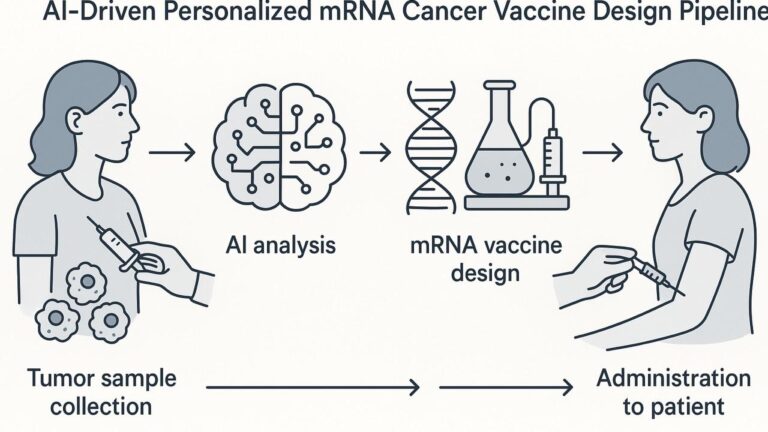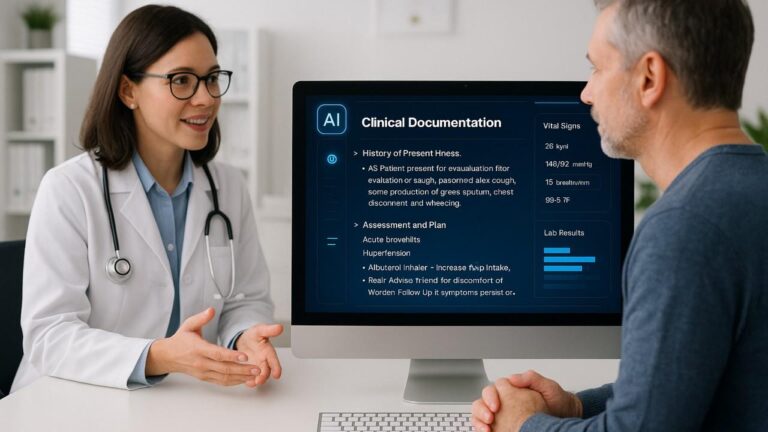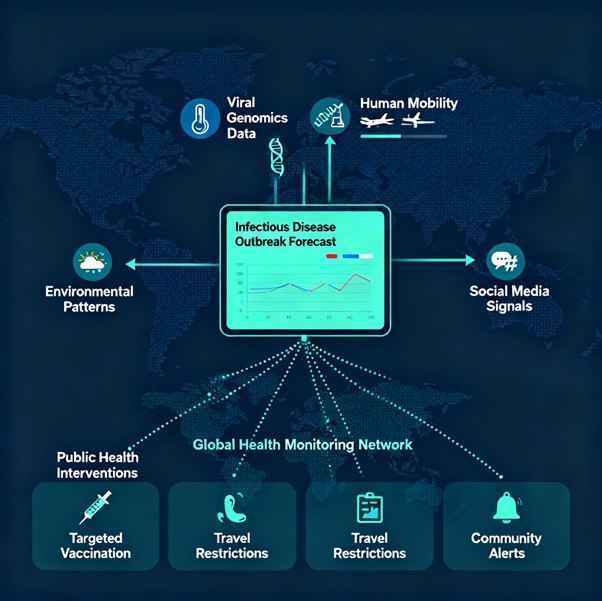Artificial Intelligence in Drug Development: The Complete Guide for Life Sciences Professionals in 2025
The pharmaceutical industry stands at a transformative crossroads. After decades of escalating costs, extended timelines, and disappointing success rates, a technological revolution is reshaping how we discover, develop, and deliver life-saving medications. Artificial intelligence in drug development has evolved from an experimental concept to an operational necessity that’s driving the industry’s most significant breakthroughs.

Consider this reality: developing a single new drug traditionally costs $2.6 billion and takes 10-15 years, with a staggering 90% failure rate in clinical trials. Yet companies implementing AI technologies are seeing dramatic improvements—AI-discovered drugs show 80-90% Phase I success rates compared to the traditional 40-65% industry average. This isn’t incremental progress; it’s a fundamental transformation that’s redefining what’s possible in pharmaceutical research.
Understanding AI: The Technology Transforming Medicine
Artificial Intelligence refers to computer systems that can perform tasks typically requiring human intelligence—learning from data, recognizing patterns, making predictions, and solving complex problems. In pharmaceutical applications, AI encompasses several interconnected technologies that work together to revolutionize drug development.
Core AI Technologies in Pharmaceutical Research
Machine Learning (ML) forms the foundation of most pharmaceutical AI applications. These algorithms learn from vast datasets to identify patterns and make predictions without being explicitly programmed for each specific task. In drug development, ML analyzes molecular structures, patient data, and clinical outcomes to predict which compounds are most likely to succeed.
Deep Learning, a sophisticated subset of ML, uses neural networks inspired by the human brain to analyze complex biological data. These systems excel at interpreting medical images, predicting protein structures, and identifying subtle patterns in clinical data that human researchers might miss.
Natural Language Processing (NLP) enables computers to understand and analyze human language, extracting insights from medical literature, clinical notes, and regulatory documents. This technology is revolutionizing how researchers access and synthesize the vast body of biomedical knowledge.
Computer Vision analyzes medical images and visual data with superhuman precision, detecting disease progression, analyzing tissue samples, and monitoring patient responses with accuracy that often exceeds human specialists.
Generative AI represents the cutting edge, creating entirely new molecular structures, synthetic patient data for research, and even optimized clinical trial protocols. This technology doesn’t just analyze existing data—it generates novel solutions that expand the boundaries of what’s possible.
AI Applications Across Drug Development: From Discovery to Market
The integration of AI in pharmaceutical research spans every stage of drug development, creating unprecedented opportunities for efficiency and innovation.
Drug Discovery: Accelerating the Search for New Medicines
Traditional drug discovery relies on screening millions of compounds through trial-and-error approaches. AI-powered drug discovery transforms this process into a targeted, predictive endeavor.
Molecular Design and Optimization: Generative AI models create novel molecular structures with desired properties, dramatically expanding the chemical space researchers can explore. MIT’s discovery of halicin, a powerful new antibiotic identified through AI analysis, exemplifies this capability. The AI system analyzed existing molecular structures and generated new candidates with enhanced antibacterial properties—work that would have taken years using traditional methods.
Target Identification: AI algorithms analyze complex biological datasets to uncover disease-causing targets such as proteins or genes. DeepMind’s AlphaFold has revolutionized this field by accurately predicting protein structures for nearly the entire human proteome, providing invaluable insights for therapeutic design.
Drug Repurposing: AI identifies new applications for existing medications by analyzing vast clinical and molecular datasets. This approach can save years of development time and hundreds of millions in costs by finding new uses for already-approved drugs.
Preclinical Development: Predicting Success and Safety
Predictive Toxicology powered by AI analyzes preclinical data to forecast safety profiles before human testing begins. These models can identify potential adverse effects, enabling early elimination of risky candidates and preventing costly late-stage failures.
Biomarker Discovery: AI systems identify predictive biomarkers that indicate which patients are most likely to respond to specific treatments. This capability is essential for developing precision medicines and designing successful clinical trials.
Clinical Trials: Revolutionizing Patient Research
AI in clinical trials addresses some of the most persistent challenges in pharmaceutical research, from patient recruitment to data analysis.
Smart Trial Design: AI models simulate thousands of trial scenarios to optimize protocols before patient enrollment begins. These systems predict optimal endpoints, inclusion criteria, and dosing regimens that maximize success probability while minimizing patient burden.
Patient Recruitment and Stratification: Machine learning algorithms analyze electronic health records, genetic profiles, and demographics to identify suitable trial candidates. This approach improves enrollment speed, ensures representative patient populations, and increases trial success rates.
Real-Time Monitoring: AI-powered systems continuously analyze trial data to identify potential safety issues, protocol deviations, and efficacy signals. This capability enables proactive intervention and prevents minor issues from becoming major problems.
Automated Data Management: AI streamlines data collection, cleaning, and analysis, reducing human error while accelerating timeline. These systems can automatically generate clinical study reports, cutting preparation time by 40% while improving accuracy.
The Competitive Advantage: Measurable Benefits of AI Implementation
The value of AI in pharmaceutical development extends beyond theoretical potential to deliver concrete, measurable improvements across key performance indicators.
Time and Cost Reduction
Accelerated Development Timelines: AI applications can shorten overall drug development by 1-4 years. In preclinical stages alone, the Boston Consulting Group projects 25-50% time and cost savings through AI implementation.
Enhanced Operational Efficiency: AI-enabled site selection improves identification of top-enrolling sites by 30-50% and accelerates patient enrollment by 10-15% across therapeutic areas. For a single Phase III trial, this translates to $10-50 million in cost savings and 6-12 months in time reduction.
Improved Success Rates
The most compelling evidence of AI’s impact lies in improved clinical outcomes. Studies demonstrate that AI-discovered drugs in Phase I trials achieve success rates of 80-90%—substantially better than the traditional 40-65% industry average. This improvement means fewer costly failures and more promising treatments reaching patients.
Financial Returns
McKinsey analysis shows that GenAI-enhanced interactions with regulatory authorities can increase an asset’s net present value by 20% through improved data quality. Automating clinical study report generation can increase an asset’s NPV by $15-30 million per study.
Regulatory Evolution: Global Guidelines Embrace AI
Regulatory agencies worldwide are establishing comprehensive frameworks for AI regulation in clinical trials, recognizing both the tremendous potential and inherent responsibilities of these technologies.
FDA’s Landmark Guidance
The FDA has emerged as a global leader in AI regulation. Following extensive consultation with industry experts, the agency published landmark draft guidance in January 2025: “Considerations for the Use of Artificial Intelligence to Support Regulatory Decision Making for Drug and Biological Products.”
This guidance establishes a risk-based credibility assessment framework requiring sponsors to provide detailed documentation on AI model architecture, inputs, outputs, and validation processes. Key requirements include:
- Transparency and Explainability: AI systems must provide clear explanations for decisions affecting patient safety
- Bias Mitigation: Rigorous testing to ensure equitable performance across all demographic groups
- Continuous Monitoring: Ongoing surveillance to maintain AI system performance and safety
- Human Oversight: Ultimate human responsibility for critical decisions
The FDA has also conducted specific sessions addressing “The Role of Artificial Intelligence in Clinical Trial Design and Research,” demonstrating regulatory recognition of AI as an integral component of modern drug development.
European Leadership
The European Medicines Agency (EMA) has taken similarly progressive steps, establishing dedicated AI offices and comprehensive integration frameworks. In March 2025, the EMA’s human medicines committee issued its first qualification opinion on an AI-based methodology (AIM-NASH), confirming acceptance of clinical evidence generated by validated AI tools under human supervision.
This milestone represents crucial precedent for regulatory acceptance of AI-generated evidence and signals growing confidence in properly implemented AI technologies.
FDA’s Revolutionary AI Tool: ELSA
In a groundbreaking development, the FDA launched ELSA (Enterprise Large-Scale AI), a generative AI tool designed to help employees work more efficiently across all agency functions. Commissioner Dr. Marty Makary reported the tool, rolled out “ahead of schedule,” is already cutting some scientific review tasks from “two to three days” down to “six minutes”.
ELSA is already being used in clinical protocol reviews, scientific evaluations and to identify high-priority inspection targets. This represents a fundamental shift in how regulatory agencies approach AI—not just regulating it, but actively implementing it to improve regulatory efficiency and decision-making quality.
The significance of ELSA extends beyond operational efficiency. It demonstrates the FDA’s commitment to AI integration and validates AI as an essential tool for modern pharmaceutical regulation. ELSA has been used in training across the agency by scientists, reviewers and field investigators to support decision-making, establishing a new standard for regulatory operations.
EMA’s Comprehensive AI Development Program
The European Medicines Agency has launched equally ambitious AI initiatives. In March 2024, EMA introduced an AI-enabled knowledge mining tool called Scientific Explorer for EU regulators, enabling easy, focused and precise search of regulatory scientific information to support decision-making.
EMA and the Heads of Medicines Agencies (HMAs) have published an artificial intelligence workplan to 2028, setting out a collaborative and coordinated strategy to maximise the benefits of AI to stakeholders while managing the risks. This comprehensive approach includes:
- AI Training Modules: Development of specialized training programs for regulatory personnel
- Multi-stakeholder Workshops: Regular collaborative sessions bringing together industry, academia, and regulatory experts
- Scientific Explorer Tool: AI-powered regulatory information mining system
- Coordinated EU Strategy: Harmonized approach across all European regulatory agencies
The EMA’s approach demonstrates systematic preparation for AI integration across European medicines regulation, ensuring regulatory personnel are equipped with the knowledge and tools necessary for effective AI oversight.
ICH E6(R3): Revolutionary GCP Updates Including AI Integration
On January 6, 2025, the ICH E6(R3) Guideline for Good Clinical Practice reached Step 4 of the ICH process, marking a significant milestone in promoting more efficient, high-quality, and patient-centric clinical trials. This landmark update represents the most comprehensive revision of GCP guidelines in decades.
ICH E6(R3) introduces innovative provisions designed to apply across various types and settings of clinical trials, ensuring continued relevance in the face of ongoing technological and methodological advancements. The guideline specifically addresses AI integration in clinical trials, establishing frameworks for:
- AI-Powered Trial Management: Guidelines for implementing AI systems in trial conduct and monitoring
- Digital Evidence Collection: Standards for AI-generated data and evidence validation
- Automated Decision-Making: Requirements for AI systems involved in clinical decisions
- Continuous Learning Systems: Frameworks for adaptive AI systems that evolve during trials
The ICH guideline supports the ethical and effective integration of AI into clinical trials, addressing opportunities, challenges, and best practices as AI reshapes clinical trials by enhancing efficiency, accuracy, and scalability.
Global Harmonization and Implementation Standards
The International Council for Harmonisation (ICH) is developing comprehensive guidelines to create consistent AI standards across jurisdictions. This harmonization effort focuses on:
- Good Machine Learning Practice (GMLP): Standardized approaches for AI system development and validation
- Cross-Border Collaboration: Enabling efficient international drug development with AI technologies
- Patient-Centric Applications: Ensuring AI implementations demonstrate clear benefits to patients
- AI Ethics Framework: Global standards for ethical AI implementation in clinical research
- Regulatory Submission Requirements: Harmonized documentation standards for AI-enabled studies
Real-World Implementation: Leading Companies Setting the Standard
Major pharmaceutical companies aren’t experimenting with AI—they’re building their competitive strategies around comprehensive AI implementation.
Pfizer’s Strategic AI Integration
Pfizer has embraced AI through partnerships with Tempus, CytoReason, and Gero, integrating these technologies across drug discovery, clinical trials, and patient analysis. The company’s AI implementation accelerated COVID-19 treatment development, including Paxlovid, demonstrating AI’s capability in urgent therapeutic development.
Pfizer’s AI applications span:
- Drug Discovery: AI-powered molecular design and target identification
- Clinical Development: Automated documentation and regulatory submissions
- Patient Selection: AI-driven biomarker identification and population analysis
- Regulatory Affairs: AI-assisted submission preparation and approval processes
Novartis’s Billion-Dollar Commitment
Novartis announced a collaboration with Generate Biomedicines worth up to $1 billion to apply generative AI for protein drug discovery. This investment represents operational commitment to AI as core technology rather than exploratory research funding.
Industry-Wide Adoption
Top-performing pharmaceutical companies (Roche, Novo Nordisk, Eli Lilly, AstraZeneca, and Novartis) demonstrate comprehensive AI adoption alongside exceptional R&D effectiveness and strong pipelines. These organizations use AI not for competitive advantage but as fundamental infrastructure for modern drug development.
Clinical Research Organizations Leading Change
Contract research organizations are implementing AI-powered solutions across operations:
Medidata AI: Provides intelligent trial platforms used by academic institutions and government organizations to enhance clinical research efficiency and patient outcomes.
Launch Therapeutics: Uses Medidata AI Intelligent Trials to accelerate clinical trial preparation and execution.
Site Selection Optimization: AI algorithms analyze historical enrollment data, investigator performance, and patient populations to identify optimal sites before trial initiation.
The Workforce Revolution: Career Implications of AI Integration
The integration of AI in clinical research careers is creating fundamental changes in job requirements, skill expectations, and advancement opportunities across the pharmaceutical industry.
Traditional Roles Requiring AI Literacy
Clinical Research Associates (CRAs) must now interpret AI-generated monitoring reports, understand risk-based monitoring algorithms, and work with AI-powered data systems. The role is evolving from manual site visits to strategic oversight of AI-driven processes.
Medical Writers need familiarity with AI-assisted document generation while maintaining responsibility for accuracy, regulatory compliance, and scientific rigor. AI handles initial drafts; humans provide strategic analysis and final validation.
Project Managers require understanding of AI-driven timeline predictions, resource optimization algorithms, and digital trial management systems. Success depends on effectively coordinating AI-powered workflows rather than manual task management.
Biostatisticians must validate and interpret machine learning models while designing AI algorithms that meet regulatory statistical requirements. Traditional statistical expertise remains essential but must be combined with AI system understanding.
Regulatory Affairs Professionals handle AI-related submissions, explain AI model credibility to health authorities, and ensure AI systems meet evolving regulatory requirements.
Emerging AI-Enabled Career Opportunities
The pharmaceutical industry is creating entirely new professional categories at the intersection of clinical science and data science:
- Director, AI & Innovation Strategy: Leading organizational AI transformation initiatives
- Principal, AI Data Scientist: Developing and validating AI models for clinical applications
- Senior Scientist, Generative AI & Agentic Modeling: Creating AI systems for drug discovery and development
- AI & Data Life Sciences Clinical Consultant: Implementing AI solutions across clinical operations
- Digital Clinical Trial Manager: Overseeing AI-powered trial operations and technology integration
Skills Essential for Success
Technical Competencies: Understanding AI fundamentals, machine learning applications, and data analysis principles has become essential across clinical research roles. Professionals need familiarity with AI system capabilities, limitations, and validation requirements.
Regulatory Knowledge: As AI-specific regulations evolve, professionals must understand new compliance requirements, validation frameworks, and submission processes for AI-enabled studies.
Cross-Functional Collaboration: Success requires effective communication between clinical researchers, data scientists, IT professionals, and regulatory experts. The ability to bridge technical and clinical domains is increasingly valuable.
Critical Thinking: While AI handles data analysis, humans provide strategic insight, ethical judgment, and complex decision-making that requires understanding context and implications beyond algorithmic outputs.
The Risks of Falling Behind: Career Consequences of AI Illiteracy
Life sciences professionals who delay AI skill development face increasingly significant career limitations in an industry rapidly organizing around AI-powered operations.
Immediate Market Reality
Hiring Requirements: Job postings routinely include AI competency requirements, even for traditionally non-technical roles. Candidates without AI literacy find themselves eliminated from consideration regardless of other qualifications.
Promotion Barriers: Advancement increasingly requires understanding AI system capabilities and limitations. Professionals lacking AI knowledge struggle to contribute strategically to organizational decision-making.
Compensation Impact: AI-literate professionals command premium compensation reflecting their enhanced value in AI-driven organizations.
Organizational Changes
Companies are restructuring operations around AI capabilities, creating environments where non-AI-literate professionals cannot effectively contribute. Traditional approaches become obsolete as organizations adopt AI-powered workflows and decision-making processes.
Operational Efficiency: Teams without AI-literate members cannot achieve competitive performance levels in time-sensitive, cost-conscious pharmaceutical development.
Strategic Planning: Organizations require professionals who understand AI capabilities for effective resource allocation and strategic planning in AI-enabled environments.
The Solution: Strategic Professional Development
For professionals recognizing the need for AI competency, structured learning approaches provide the most effective path to industry relevance.
Comprehensive Training Programs
AI Clinical Research Education must combine technical understanding with practical application and regulatory knowledge. Effective programs address both AI fundamentals and specific clinical research applications.
The Artificial Intelligence in Clinical Research course at IICRS provides comprehensive training designed specifically for clinical research professionals. The program covers:
- AI Fundamentals: Understanding machine learning, deep learning, and other AI technologies in clinical contexts
- Regulatory Compliance: Navigating FDA, EMA, and ICH requirements for AI-enabled clinical research
- Implementation Strategy: Managing AI system deployment, validation, and continuous monitoring
- Practical Applications: Hands-on experience with AI tools and platforms used in clinical research
- Career Development: Positioning for advancement in AI-enabled pharmaceutical organizations
Immediate Action Steps
Assess Current Position: Evaluate existing skills against AI-literate role requirements in your organization and target positions.
Develop Learning Plan: Identify specific AI competencies relevant to your role and career objectives.
Seek Practical Experience: Engage with AI-powered tools and systems in current work contexts to build hands-on familiarity.
Build Professional Network: Connect with AI-literate colleagues and industry professionals to understand implementation experiences and career pathways.
Invest in Formal Education: Enroll in structured AI training programs that combine technical knowledge with clinical research applications.
The Future Landscape: What’s Coming Next
The trajectory of AI in pharmaceutical development points toward even more comprehensive integration across drug development processes.
Advanced AI Capabilities
Autonomous Trial Management: AI systems will increasingly manage trial operations with minimal human intervention, optimizing protocols in real-time based on emerging data.
Personalized Medicine at Scale: AI will enable truly individualized treatments based on genetic profiles, lifestyle factors, and continuous health monitoring.
Predictive Safety Monitoring: Advanced AI will predict and prevent adverse events before they occur, improving patient safety while enabling continued development of promising therapies.
Regulatory Evolution
Streamlined Approvals: As AI demonstrates consistent safety and efficacy benefits, regulatory acceptance will expand, enabling faster approvals for AI-generated evidence.
Global Harmonization: International standardization of AI validation requirements will facilitate efficient multinational drug development.
Workforce Transformation
Enhanced Human-AI Collaboration: Future roles will involve sophisticated partnerships between human expertise and AI capabilities, with humans providing strategic oversight and ethical guidance.
Specialized Career Paths: Distinct career tracks will emerge for professionals specializing in AI implementation, validation, and management in clinical research contexts.
Conclusion: The Time for Action is Now
The pharmaceutical industry’s AI transformation represents a defining moment for life sciences professionals. The evidence is overwhelming: AI has become essential infrastructure for competitive drug development, regulatory agencies have established AI-friendly frameworks, and leading companies are organizing their strategies around AI capabilities.
For professionals, the choice is straightforward but urgent. Those who develop AI competency position themselves for advancement in an industry increasingly dependent on AI-powered operations. Those who delay risk marginalization as the industry continues its rapid transformation.
The window for adaptation is narrowing. Companies are making hiring and promotion decisions based on AI literacy. Regulatory agencies expect AI competency in submissions. Market leaders are achieving superior performance through AI implementation.
The solution requires immediate action: invest in comprehensive AI education that combines technical understanding with clinical research applications. Develop the competencies necessary to thrive in AI-enabled organizations. Position yourself as part of the solution rather than a legacy of traditional approaches.
The future of pharmaceutical development belongs to professionals who embrace AI as an essential tool for improving human health. The question isn’t whether AI will transform your career—it’s whether you’ll be prepared for that transformation.
The time for preparation is now. The industry will continue advancing with or without individual professionals who choose not to adapt. Make the choice that ensures your continued relevance in an AI-powered pharmaceutical future.






